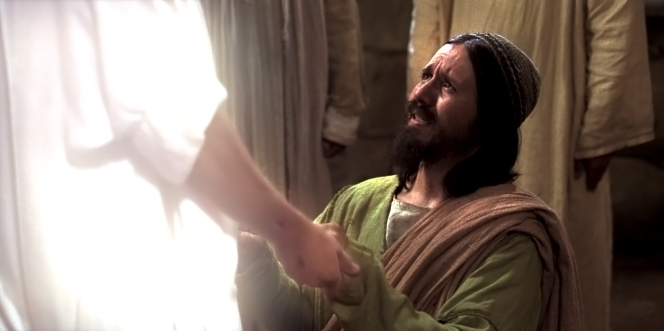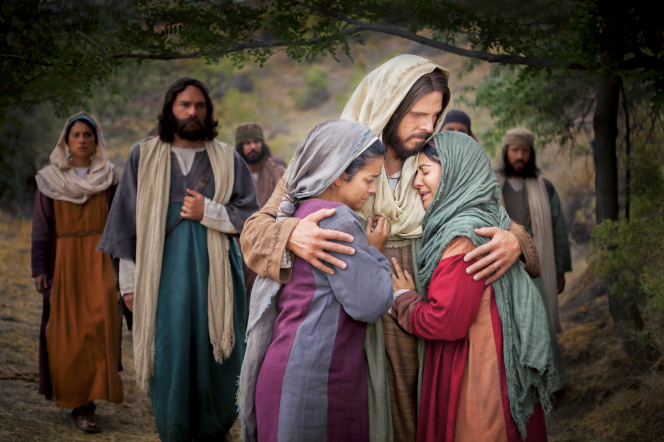The question "Why is this happening to me?" can be a soul expanding question when we ask it in humility and learn what God wants us to learn, sometimes that question can become debilitating if we ask it in shame or embarrassment or anger.
It is easy to believe that your trials come because you were faithful enough. If only I had enough faith, if only I was more obedient, if only I had a stronger testimony.
Prior to a major trial, you may have felt confident in your faith and testimony. I know that prior to my divorce I felt like I had unshakeable faith and never ending courage. In spite of the difficulties of my marriage I felt like if I pressed forward with faith my marriage could be saved and we could be happy. When that didn't happen, you can see how my faith might have been shaken.
After my divorce I constantly questioned my testimony and my faith. In fact, three years later and I am still questioning my faith and testimony. Is it strong enough? Do I really believe what I say I believe? Do I have an unshakable testimony? Do I have enough faith?
Satan wants us to believe that our faith isn't strong enough. He wants us to think our testimony isn't good enough. But those are lies.
No matter the source of our trials, whether caused by our own sin and weaknesses, the sin and weaknesses of others, or simply this fallen world, the Savior's atonement can strengthen us.
Maybe my testimony wasn't as strong as I thought it was. Maybe I don't have as much faith as I thought I had. But if I turn to the Savior during my trials my testimony and faith will be strengthened. As the father in the New Testament pled with the Savior, "Lord, help thou mine unbelief" so, too, can the Savior help strengthen our faith and testimony.
Sunday, October 9, 2016
Thursday, October 6, 2016
Wake Up! Don't You Know What We Have?
"Sometimes we sleepwalk on the path of discipleship."
- Pres. Uchtdorf
Saturday AM Session General Conference October 2016One of those repetitive lessons that we hear over and over again is the plan of salvation. It seems like such a simple thing, such a plain truth, that it is easy to take for granted. In his Saturday morning address, President Uchtdorf explained that when people would ask about the Church he would usually start with something about the word of wisdom, or draw parallels between our beliefs and the beliefs of other religions. However, he mentioned, explaining the plan of salvation to people had the biggest impact. He said:
Some of my friends would say that this message felt familiar, even though such things were never taught in their religious upbringing. It was as if they had always known these things to be true, as if I was simply casting light on something that was always and deeply rooted in their hearts.A few weeks ago, I came across this video - some missionaries in the Billings Montana mission rapping about the first lesson the missionaries usually teach - the lesson about the restoration and the plan of salvation. I enjoy rap in general (clean rap, which is hard to find!) but this song resonated with me in a way no other song outside of the hymnbook has ever been able to do.
 I believe it is because the content is so powerful. The plan of salvation is such a powerful truth. I love President Uchtdorf's description of the plan of salvation in his talk. If you haven't read it I highly encourage you to read it. I may print it out and make a goal to read it at least once a week, even though it is so familiar to me. President Uchtdorf cautioned, "It seems to be human nature: as we become more familiar with something, even something miraculous and awe-inspiring, we lose our sense of awe and treat it as commonplace." I don't want to treat the glorious doctrine of restoration and the atonement and the gospel plan as commonplace! I want to adore it and appreciate it.
I believe it is because the content is so powerful. The plan of salvation is such a powerful truth. I love President Uchtdorf's description of the plan of salvation in his talk. If you haven't read it I highly encourage you to read it. I may print it out and make a goal to read it at least once a week, even though it is so familiar to me. President Uchtdorf cautioned, "It seems to be human nature: as we become more familiar with something, even something miraculous and awe-inspiring, we lose our sense of awe and treat it as commonplace." I don't want to treat the glorious doctrine of restoration and the atonement and the gospel plan as commonplace! I want to adore it and appreciate it.
President Uchtdorf's sleepwalking comment hit me between the eyes. Do I sleepwalk on the path of discipleship? I think I have been sleeping walking for a while, and I want to wake up! Well, this is me waking up! What am I going to do to show that I am not sleepwalking? I am going to share the glorious message of the plan of salvation and the love of our Father in Heaven for us! I encourage you to do the same. Share the plan any time you can with whoever you can.
"What shall we give in return for the flood of light and truth God has poured out upon us?" (Pres. Uchtdorf)
Footnotes:
gratitude,
love,
plan of salvation,
sharing the gospel
Tuesday, October 4, 2016
Remember
Sometimes, when studying the gospel, I get bored of the topics I am studying. Particularly at church in Sunday School and sometimes in Relief Society. I crave something new, something deeper. I get bored with the same gospel topics every week, the same discussions, the same comments, everything the same. I have always understood the value of these repetitive lessons for those who haven't learned the lessons, those who are new to the church, and such. But only recently have I learned the true value of those lessons for me.
As I was completing a requirement for Personal Progress with my youth age daughter, I came across this scripture in 2 Peter 1
What a humbling verse of scripture. Peter knew that the Saints already knew these gospel topics. He wasn't trying to teach them something new. He simply understood the principle of putting people "always in remembrance" of the things that are most important - the plain and precious, simple parts of the Gospel of Jesus Christ.
As a math teacher and a musician you would think that I already clearly understood this idea.
In order to be a good mathematician, you need to be constantly reviewing the basics - if you aren't constantly using your times tables, you forget them. If you don't frequently solve equations, or factor polynomials, you won't be very good at it.
Professional musicians will agree that in order to be a good musician, you still need to practice the basics, your scales, etudes, and so on. When practicing even an advanced piece, you should stop and practice intonation, bowings, fingers and such.
This principle of remembering is so vital to everything we do in life - even walking or using a muscle. A broken arm will need to remember how the muscles move after being confined to a cast or sling for so long. It's amazing to me that I didn't full recognize the importance of this principle until much later.
It has changed my perspective of repetitive messages in Sunday School and Relief Society lessons, and even in General Conference talks. I now crave the repetition, I need it to keep me straight and keep me grounded in the gospel of Jesus Christ.
What things do you get bored of? Does the principle of remembering change your perspective?
As I was completing a requirement for Personal Progress with my youth age daughter, I came across this scripture in 2 Peter 1
Wherefore I will not be negligent to put you always in remembrance of these things, though ye know them, and be established in the present truth.
 |
| Image Credit: LDS Media Library |
As a math teacher and a musician you would think that I already clearly understood this idea.
In order to be a good mathematician, you need to be constantly reviewing the basics - if you aren't constantly using your times tables, you forget them. If you don't frequently solve equations, or factor polynomials, you won't be very good at it.
Professional musicians will agree that in order to be a good musician, you still need to practice the basics, your scales, etudes, and so on. When practicing even an advanced piece, you should stop and practice intonation, bowings, fingers and such.
This principle of remembering is so vital to everything we do in life - even walking or using a muscle. A broken arm will need to remember how the muscles move after being confined to a cast or sling for so long. It's amazing to me that I didn't full recognize the importance of this principle until much later.
It has changed my perspective of repetitive messages in Sunday School and Relief Society lessons, and even in General Conference talks. I now crave the repetition, I need it to keep me straight and keep me grounded in the gospel of Jesus Christ.
What things do you get bored of? Does the principle of remembering change your perspective?
Footnotes:
gospel principles,
Jesus Christ
Monday, October 3, 2016
Nearer, My God, to Thee
 |
| Image Credit: LDS Media Library |
General Conference this weekend was exactly what I needed, exactly when I needed it.
Elder Ronald A. Rasband's talk really penetrated my heart. His reminder to never forget the spiritual experiences we have had struck me. When I was regularly studying the gospel, I had many spiritual experiences that I, thankfully, recorded in my journal. Lately I have been lacking in my study of the gospel, mostly because I went to grad school and spent all of my time on graduate studies. I tried to at least keep up on reading the Book of Mormon, although I didn't have much time to devote to the study of it. I just kept reading. I believe that helped me through what was a very stressful time in my life.
When I mentioned to my husband that I needed to find a time to study the gospel, he mentioned to me that I should spend my lunch period at work studying the gospel and writing in my blog. I have to pump on my lunch period because I am breastfeeding, so I am tied to my desk in my classroom. I have been having a little bit of a pity party about it the past few weeks because I like spending time in the faculty room with my colleagues, and I liked being able to take a break from work. But lately I have been working through my lunch since I am attached to my desk anyway. It is hard to stop and do something else. But this! This, studying the gospel. I can take a break from work for that!
So if you need a little lunch time pick-me-up, feel free to check out my blog around lunch time during the work week. I will likely post something every day. If it doesn't help you, at least it will be helping me!
What messages hit you the hardest during General Conference? What changes are you planning to make in your life because of what you heard? Did you notice any themes?
Footnotes:
General Conference,
scripture study
Sunday, July 31, 2016
Naptime Epiphany
 |
| Image Credit: peasap |
My two year old has (normal) autonomy issues. He only wants to do what he wants to do, and does not want anyone telling him what to do. To illustrate this point, today I told him it was time to go read in the rocking chair. He had a full on meltdown complete with kicking and screaming.
"I know it's really hard to do things that you don't want to do. But it's time for us to sit quietly and read."
kick-scream-tantrum "Le-GO! Le-GO!"
"If I let you go it will be to put you in your crib so that you can fall asleep on your own. Should I put you in your crib?"
kick-scream-tantrum "Le-GO! Le-GO!"
"Okay" I put him in his crib. "I will be right here in the rocking chair ready to hold you when you want to sit quietly." I sat down on the rocking chair next to his crib and watched as he turned beet red and tried furiously to climb out of his crib. I could tell when he realized his attempts were futile, and used the moment to offer my help.
"Would you like me to help you?"
scream-scream-scream
"Would you like me to hold you?"
calm
"I could help you get out and I could hold you in the rocking chair."
Him: "Hold you?"
So I picked him up and he snuggled right down in my arms in the rocking chair, apparently convinced that snuggling with mom in the rocking chair was better than attempting to get out of his crib while turning red in the face and screaming.
Four verses of I am a Child of God later, and he was almost out. And I felt a little wiser, because I had an epiphany.
Just as I, as a mother, did not force anything on my sweet, innocent two year old, and I did not punish him for not wanting to take a nap, Heavenly Father does not force His will on us, and He does not punish us for not abiding by His will. At the same time, He does not shield us from the natural consequences of our stubbornness and pride. He sits quietly by and waits for us to realize that our way is not ideal, so that He can quietly say, "Would you like me to help you? Would you like me to hold you?"
He wants us to want His way. He wants us to decide, on our own, that His way is better than our way (even though He has told us before). But He doesn't force us, and He doesn't punish us. He just waits for us to come around, face our fears and give up our pride so that He can bless us and give us peace.
How often do you, like a toddler, scream red-faced trying to get out of your prison? How have you learned to accept God's will and want it for yourself?
Footnotes:
children,
compassion,
patience
Subscribe to:
Comments (Atom)
